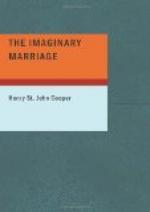“You shall not suffer!”
“Don’t—don’t you understand that if people should think—think of such a thing and me—that they should speak of it and utter my name—Lies or truth, it would be almost the same; the shame of it would be horrible—horrible!” She was trembling.
“Tell me, have you seen this man?”
“Yes, last Saturday. He wrote ordering me to meet him. In every line of the letter I read threats. I—I had to go; it was money, of course, five thousand pounds.”
“And you didn’t promise?” His voice was harsh and sharp, and looking at him she saw a man changed, a man whose face was hard and stern, and whose mouth had grown bitter. And, knowing it was for her, she knew that she had never admired him before as she did now.
“I promised nothing. I am to meet him again to-morrow night and—and tell him what I have decided. It is not the money, but—but to pay would seem as if I—I were afraid. And oh, I have paid before!”
“I know! And to-morrow you will meet him?”
“I—but—”
“You will meet him, Joan, but I shall be there also. Tell me where!”
She described the place, and he remembered it and knew it well enough.
“I shall be there, remember that. Go without fear—answer as you decide, but remember you pay nothing—nothing. And then I,”—he paused, and smiled for the first time—“I will do the paying.”
CHAPTER XXXVII
THE DROPPING OF THE SCALES
It was like turning back the pages of a well-loved book, a breath out of the past. For this afternoon it seemed to John Everard that his little friend, almost sister, had come back to him.
And yet it seemed to Johnny, who studied her quietly, that here was one whom he had never known, never seen before. The child had been dear to him as a younger sister, but the child was no more.
And to-day, for these few brief hours, Ellice gave herself up to a happiness that she knew could be but fleeting. To-day she would be the butterfly, living and rejoicing in the sun. The darkness would come soon enough, but to-day was hers and his.
How far in his boldness John Everard drove that little car he did not quite realise, but it was a slight shock to him to read on a sign-post “Holsworth four miles,” for Holsworth was more than forty miles from Little Langbourne.
“Gipsy, we must go back,” he said. “We’ll get some tea at the farmhouse we passed a mile back, and then we will hurry on. Con will be worrying.”
They had tea at the little farmhouse, and sat facing one another, and more than ever grew the wonder in Johnny’s mind. Why—why had this girl changed so? What was the meaning of it, the reason for it? It was not the years, for a few days, a few short weeks had wrought the change. And then he remembered with a sense of shame and wrongdoing that, strangely enough, he had scarcely flung one thought to Joan all that long afternoon.




